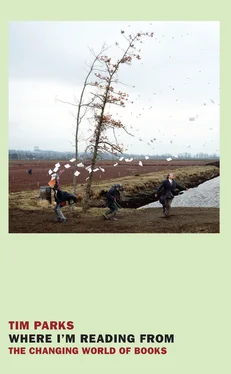But if too much money can be damaging, dribs and drabs are not going to get the best out of a writer either. Our persistent romantic desire that the author, or at least his or her work, be somehow detached from the practicalities of money, together with the piety that insists that novels and poems be analyzed quite separately from the lives of their creators, has meant that there have been very few studies of the relationship between a writer’s work and income. Randall Jarrell’s 1965 introduction to Christina Stead’s masterpiece, The Man Who Loved Children (1940), is a rare exception; seeking to recover Stead’s writing for a new generation, Jarrell suggested that the Australian writer’s failure to find a regular publisher—which he ascribed partly to her writing such wonderfully different novels, partly to her political position, and partly to her moving around so much from one country to another—eventually had a detrimental effect on her writing. Despite having written a dozen highly-praised novels, she had no community of reference, no group of critics who felt obliged to track her development from one work to the next, and as a result poor sales, to the point that she was eventually obliged to take in typing work to survive. Her profound sense of frustration and disillusionment began to color the writing itself, making it shriller and more self-indulgent, something Jarrell feels would not have happened had her publishing circumstances been different.
The important idea here, it seems to me, is that of a community of reference. Writers can deal with a modest income if they feel they are writing toward a body of readers who are aware of their work and buy enough of it to keep the publisher happy. But the nature of contemporary globalization, with its tendency to unify markets for literature, is such that local literary communities are beginning to weaken, while the divide between those selling vast quantities of books worldwide and those selling very few and mainly on home territory is growing all the time.
It would be intriguing here to run a comparison of the incomes and work of writers like U. R. Ananthamurthy, an Indian who has continued to write in his native Kannada language and whose translated fiction, when you can get hold of it, has all the difficulty and rewards of the genuinely exotic, and the far more familiar Indians writing in English (Salman Rushdie, Vikram Seth, and others) who have used their energy and imagination to present a version of India to the West where exoticism is at once emphasized and made easy. Ananthamurthy, in his eighties, has worked steadily and convincingly for decades, presumably on a fairly modest income; those more celebrated names, working in the glamour of huge advances and writing to the whole world rather than any particular community, find themselves constantly obliged to risk burnout in novels whose towering ambition might somehow justify their global reputation.
But for every Ananthamurthy there will be scores of local writers who did not find sufficient income to continue; for every Rushdie there will be hundreds whose reputation never reached that giddy orbit where a certain kind of literature can survive without the sustenance of a particular community of readers.
IS THE NOVEL a space of intense engagement with the world, of risk and adventure? Or is it a place of refuge, of hanging back from life? The answer will be all too easy if we are living in a country that does not allow certain stories to be told. For Solzhenitsyn writing novels was indeed a serious risk. But in the West?
I want to toss out a provocation: that in the world of literature there is a predominance of people whose approach to life is structured around issues of fear and courage and who find it difficult to establish a stable position in relation to those values. Not that they are necessarily more fearful than others, but that a sense of themselves as fearful or courageous is crucial for them and will be decisive in the structuring of both the content and style of their work.
That certain vocations attract a particular character type is evident enough. At the university where I work in Milan, we have two graduate programs for language students, one in interpreting and one in translation. With some exceptions the difference in attitude and character between members of the two groups is evident. The students who come to translation are not looking to be out there in the fray of the conference, under the spotlights; they like the withdrawn, intellectual aspect of translation. Often their problem as they begin their careers is not so much the work itself, but the self-marketing required to find the work.
It’s also hardly revolutionary to suggest that literature can be seen simultaneously as an adventure and a refuge. Per Petterson’s novels often feature a conflicted, anxious, but would-be courageous character surrounded by reckless friends and enemies. In To Siberia the young female protagonist is excited by images of Siberia she finds in a children’s book and dreams of one day going there. Frightened of developments around her—the novel is set in wartime Denmark—she seeks comfort in reading, in fantasizing future adventures, but twice loses her source of books, once when a rich friend who has a library of her own suddenly dies, and once when a lesbian librarian makes aggressive advances at her. The virtual adventure and escape of reading is threatened by real adventure and calamity.
Throughout Petterson’s work the main characters devote a great deal of time to practical tasks that will protect them from all kinds of dangers, or just the weather. They build huts and fires with immense care, because life is perilous, exciting, frightening. In the novel It’s Fine By Me , a bildungsroman about a young Norwegian who looks for a way out of his depressing family situation in a life of writing, Petterson makes explicit that, as he sees it, the craft of writing, of carefully reconstructing life’s precariousness in sentences as solid and unassuming as bricks, is itself a way of building shelter: for those who see danger everywhere, literature is a place of safety.
We could equally well look at a classic like A Portrait of the Artist as a Young Man . Stephen is constantly frightened. The first time his name is used, his mother is demanding an apology. Rather than confronting her, he hides under the table. His aunt threatens to pull out his eyes if he doesn’t apologize. A page later he is frightened by the hurly burly of a rugby game. Pretending to participate because afraid of criticism, he actually hides on the edge of his line. The first time we see Stephen happy and relaxed, it is on his own in the sick bay where he is no longer obliged to engage in life in any way. Here for the first time we see him quoting lines of poetry, fantasizing, imagining, escaping, and in particular turning an imagined funeral into something beautiful, through words:
Two to sing and two to pray
And two to carry my soul away .
How beautiful and sad that was! How beautiful the words were . . .
Terrified of the quarrel at Christmas lunch between the nationalist Mr. Casey and the fanatically Catholic Aunt Dante, Stephen focuses on the way the antagonists speak, the words they use, which allows him to keep out of the firing line, and creates an illusion of comfortable distance. Wishing to be a bold adolescent he goes to a prostitute; terrified by a Jesuit sermon on hell, he tries to be chaste and good. Eventually, courageously resisting all claims on his loyalty, he turns to art, claiming that the artist is by vocation beyond and above the factions. All the same he needs to justify himself by imagining that his work will courageously “forge the uncreated consciousness” of his race; disengaging with all parties he will single-handedly, from the safe distance of other countries, change Ireland. He claims. The decision to move to writing can thus be conceived as courageous on the one hand, or motivated by fear of succumbing to forces that terrify him on the other; his writing is a space of refuge, but he insists that it is engaged in changing the world.
Читать дальше












